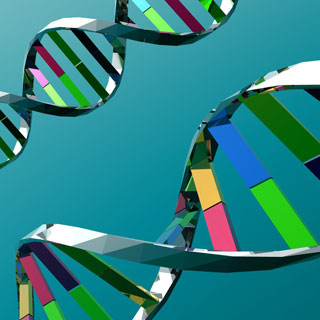

Every one of your cells contains DNA, the molecular blueprint that makes you you. Accessing that blueprint may seem like a job for scientists. But extracting DNA from your cells is actually surprisingly simple.
Mac Cowell, an advocate for open-source biotechnology, created a set of simple instructions that lets anyone isolate her own DNA in mere minutes. The rough-and-ready procedure uses basic kitchen supplies, including the best possible container: a shot glass. This DIY process won’t create the cleanest sample, but avid biohackers can purify the DNA after it’s extracted. Once you have a pure sample, you can try sorting the DNA fragments by size or building a DIY DNA-copying machine.
Materials + Tools
- A clean shot glass
- Saliva
- Dish soap
- Table salt
- Pineapple juice (or meat tenderizer, or cleaning solution for contact lenses)
- Chilled alcohol (120 proof or higher)—we used high-proof rum
- Drinking straw
- Toothpick
Instructions
- Spit into the shot glass until it’s a quarter full of your saliva. (If you’re having trouble salivating, imagine you’re sucking a lemon-flavored candy.) The saliva is laden with cells, shed from your cheeks and mouth lining, which are full of DNA.
- Add a few drops of dish soap. This will break open the cells, a process called “lysing.”
- Add a tiny splash of pineapple juice. This will clean up some of the proteins that have spilled out of your cells alongside your DNA.
- Add a pinch of salt. This causes the DNA to start clumping together.
- Swirl the shot glass to mix the ingredients.
- Gently fill the rest of the shot glass with the high-proof alcohol, which should sit in a layer on top of the mixture. To prevent it from mixing too much, you can add the alcohol gradually with a drinking straw: Put the straw into the alcohol, cap it with your finger, hold the straw right over the liquid in the shot glass, and release.
- Use a toothpick to spool up the cloudy, snot-like material that has formed in the glass. This is your DNA—a gross result of some cool science.
